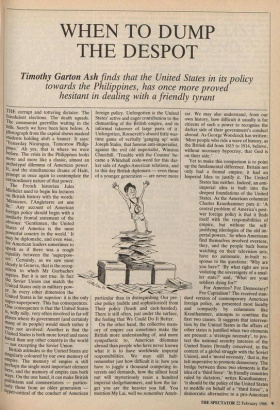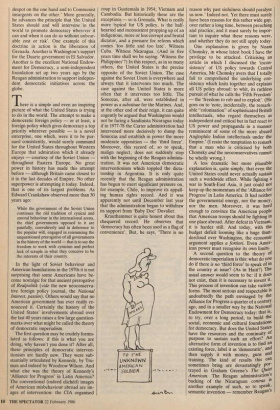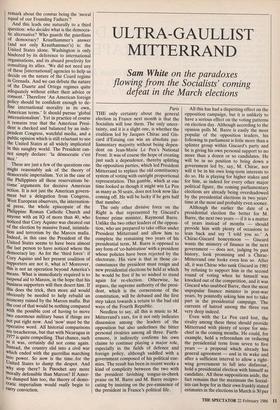WHEN TO DUMP THE DESPOT
Timothy Garton Ash finds that the United States in its policy
towards the Philippines, has once more proved hesitant in dealing with a friendly tyrant
THE corrupt and tottering dictator. The fraudulent elections. The death squads. The communist guerrillas waiting in the hills. Surely we have been here before. A photograph from the capital shows masked students holding aloft a banner. It says: `Yesterday Nicaragua, Tomorrow Philip- Pines.' Ah yes, that is where we were before. The crisis in the Philippines looks more and more like a classic, almost an archetypal dilemma of American power. It, and the simultaneous drama of Haiti, prompt us once again to contemplate the extraordinary nature of that power. The French historian Jules Michelet used to begin his lectures on British history with the words: `Messieurs, l'Angleterre est une Ile.' Any account of American foreign policy should begin with a similarly frontal statement of the obvious: 'Gentlemen, the United States of America is the most Powerful country in the world.' It may be diplomatic, and even wise, for American leaders sometimes to speak as if there was a rough equality between the `superpow- ers'. Certainly, as we saw most Clearly in Geneva, that is the recog- nition to which Mr Gorbachev aspires. But it is not true. In fact the Soviet Union can match the United States only in military pow- er. In every other dimension the United States is far superior: it is the only super-superpower. This has consequences. 9ile consequence is that the United States willy nilly, very often involved in far-off Places where its government (and certainly Many of its people) would much rather it Were not involved. Another is that the United States is both more loved and more hated than any other country in the world not excepting the Soviet Union. British attitudes to the United States are singularly coloured by our own memory of empire. The memory of empire is still Perhaps the single most important element here, and the memory of empire cuts both Ways. On the one hand, it can make British Politicians and commentators — particu- larly those from an older generation — oYper-critical of the conduct of American foreign policy. Unforgotten is the United States' active and eager contribution to the dismantling of the British empire, and its informal takeover of large parts of it. Unforgotten, Roosevelt's absurd little war- time game of verbally `ganging up' with Joseph Stalin, that famous anti-imperialist, against the evil old imperialist, Winston Churchill. 'Trouble with the Cousins' be- came a Whitehall code-word for this dar- ker side of Anglo-American relations, and to this day British diplomats — even those of a younger generation — are never more particular than in distinguishing Our pre- cise policy (subtle and sophisticated) from Their policy (brash and cack-handed). There is still often, just under the surface, the feeling that We Could Do It Better. On the other hand, the collective mem- ory of empire can sometimes make the British more understanding of, and more sympathetic to, American dilemmas abroad than people who have never known what it is to have worldwide imperial responsibilities. We may still half- remember just how difficult it is: how you have to juggle a thousand competing in- terests and demands, how the silliest local nut will ' mysteriously resist a hundred imperial sledgehammers, and how the lar- ger you are the heavier you fall. You mention My Lai, well we remember Amrit- sar. We may also understand, from our own history, how difficult it usually is for citizens of such a power to recognise the darker side of their government's conduct abroad. As George Woodcock has written: `Most people who ride a wave of history, as the British did from 1815 to 1914, believe, without necessary hypocrisy, that God is on their side.'
Yet to make this comparison is to point up the fundamental difference. Britain not only had a formal empire; it had an Imperial Idea to justify it. The United States has neither. Indeed, an anti- imperial idea is built into the deepest foundations of the United States. As the American columnist Charles Krauthammer puts it: `A central problem of America's post- war foreign policy is that it finds itself with the responsibilities of empire, but without the self- justifying ideologies of the old im- perial powers.' So when Americans find themselves involved overseas, they, and the people back home watching on their television sets, have no automatic, in-built re- sponse to the questions: `Why are you here?' By what right are you violating the sovereignty of a smal- ler state?' and, `What are your soldiers dying for?'
For America? For Democracy?
For Capitalism? The received stan- dard version of contemporary American foreign policy, as presented most lucidly and compactly by columnists like Krauthammer, attempts to combine the first two causes. It suggests that interven- tion by the United States in the affairs of other states is justified when two elements are present: a 'strategic necessity', to pro- tect the national security interests of the United States (broadly conceived, in the context of a global struggle with the Soviet Union), and a 'moral necessity,' that is, the felt imperative to promote democracy. The bridge between these two elements is the idea of a 'third force'. 'In friendly countries ruled by dictators,' writes Krauthammer, `it should be the policy of the United States to meddle on behalf of a "third force", a democratic alternative to a pro-American despot on the one hand and to Communist insurgents on the other.' More generally, he advances the principle that 'the United States should and will intervene in the world to promote democracy wherever it can and when it can do so without unbear- able cost or risk'. One example of this doctrine in action is the liberation of Grenada. Another is Washington's support for the Duarte government in El Salvador. Another is the excellent National Endow- ment for Democracy, a semi-independent foundation set up two years ago by the Reagan administration to support indepen- dent democratic initiatives across the globe.
There is a simple and even an inspiring picture of what the United States is trying to do in the world. The attempt to make a democratic foreign policy — or at least, a foreign policy which gives democracy a top priority wherever possible — is a novel enterprise, one which, were it to be pur- sued consistently, would surely command for the United States throughout Western Europe that admiration which it already enjoys — courtesy of the Soviet Union throughout Eastern Europe. No great power in history has made this attempt before — although Britain came closest to it in the last decades of Empire. No other superpower is attempting it today. Indeed, that is one of its largest problems. As Edward Crankshaw observed more than 30 years ago:
While the government of the Soviet Union continues the old tradition of cynical and amoral behaviour in the international arena, the chief governments opposed to it are painfully, convulsively and in deference to the popular will, engaged in renouncing the unquestioned prerogative of all governments in the history of the world — that is to say the freedom to work with cynicism and perfect lack of scruple in what they conceive to be the interests of their country.
In the light of Soviet behaviour and American humiliations in the 1970s it is not surprising that some Americans have be- come nostalgic for that ancient prerogative of Realpolitik (vide the new neoconserva- tive foreign policy journal, the National Interest, passim). Others would say that no American government has ever really re- nounced it. Certainly the history of the United States' involvements abroad over the last 40 years raises a few large question- marks over what might be called the theory of democratic imperialism.
The first question may be crudely formu- lated as follows: if this is what you are doing, why haven't you done it? After all, these principles of democratic interven- tionism are hardly new. They were sub- stantially articulated by Kennedy, by Tru- man and indeed by Woodrow Wilson. And what else was the theory of Kennedy's `Alliance for Progress' in Latin America? The conventional (indeed cliched) images of American misbehaviour abroad are im- ages of intervention: the CIA organised coup in Guatemala in 1954; Vietnam and Cambodia. But historically these are the exceptions — so is Grenada. What is really more typical for US policy, is the half- hearted and inconsistent propping up of an indigenous, more or less corrupt and brutal dictator, and a pressure for reform which comes 'too little and too late'. Witness Cuba. Witness Nicaragua. (And in five years time shall we be saying: 'Witness the Philippines'?) In this respect, as in so many others, the United States is the precise opposite of the Soviet Union. The case against the Soviet Unon is everywhere and always that it intervenes too much. The case against the United States is more often that it intervenes too little. The Somozas, after all, were established in power as a substitute for the Marines. And, at the other end of their reign, it can quite cogently be argued that Washington would not be facing a Sandinista Nicaragua today if in 1977-78 the Carter administration had intervened more decisively to dump the Somozas and establish in power the more moderate opposition — the 'third force'. Moreover, this record of, so to speak, malign neglect, does not suddenly stop with the beginning of the Reagan adminis- tration. It was not American democratic interventionism which toppled the dicta- torship in Argentina. It is only quite recently that the Reagan administration has begun to exert significant pressure on, for example, Chile, to improve its appall- ing human rights record. And it was apparently not until December last year that the administration began to withdraw its support from 'Baby Doc' Duvalier.
Krauthammer is quite honest about this chequered record. He observes that `democracy has often been used as a flag of convenience'. But, he says, 'There is no reason why past sinfulness should paralyse us now.' Indeed not. Yet there must surely have been reasons for this rather wide gap, over rather a long time, between preaching and practice; and it must surely be impor- tant to inquire what these reasons were, and whether they do not still apply today.
One explanation is given by Noam Chomsky, in whose latest book I have the privilege to be attacked. Criticising an article in which I discussed the 'incon- sistency' of US policy towards Central America, Mr Chomsky avers that I totally fail to comprehend the underlying con- sistency which knits together and explains all US policy abroad: to whit, its ruthless pursuit of what he calls the 'Fifth Freedom' — the 'freedom to rob and to exploit'. (He goes on to 'note, incidentally, the remark- able "colonisation" of sophisticated British intellectuals, who regard themselves as independent and critical but in fact react to US power and propaganda in a manner reminiscent of some of the more absurd Anglophile Indian intellectuals under the Empire.' (I resist the temptation to remark that a man who is criticised by both Chomsky and the neoconservatives cannot be wholly wrong.) A less dramatic but more plausible explanation is, quite simply, that even the United States could never actually sustain such a worldwide effort. While fighting a war in South-East Asia, it just could not keep up the momentum of the 'Alliance for Progress' in Latin America. It had neither the governmental energy, nor the money, nor the men. Moreover, it was hard enough to convince the American people that American troops should be fighting in one place abroad. After defeat in Vietnam, it is harder still. And today, with the budget deficit looming like a huge thun- dercloud over Washington, the economic argument applies a fortiori. Even Amer- ican power must recognise its own limits. A second question to the theory of democratic imperialism is this: what do you do if there is no 'third force' to speak of in the country at issue? (As in Haiti?) The usual answer would seem to be: if it does not exist, then it is necessary to invent it. This process of invention can take various forms. The most serious and respectable is undoubtedly the path envisaged by the Alliance for Progress a quarter of a century ago, and in a smaller way by the National Endowment for Democracy today: that is, to try, over a long period, to build the social, economic and cultural foundations for democracy. But does the United States have the resources and the continuity of purpose to sustain such an effort? An alternative form of invention is to find an existing force, label it as 'democratic', and then supply it with money, guns and training. The kind of results this can sometimes bring are devastatingly por- trayed in Graham Greene's The Quiet American. The Reagan administrations i backing of the Nicaraguan contras s another example of such, so to speak, semantic invention — remember Reagan 's remark about the contras being the `moral equal of our Founding Fathers'?
And this leads one naturally to a third question: who decides what is the democra- tic alternative? Who guards the guardians of democracy? Krauthammer's answer (and not only Krauthammer's) is: the United States alone. Washington is only hindered by its deference to international organisations, and its absurd proclivity for consulting its allies. `We did not need any of these [international] agencies to help us decide on the nature of the Coard regime in Grenada. And we can debate the nature of the Duarte and Ortega regimes quite adequately without either their advice or consent.' Therefore 'An American foreign Policy should be confident enough to de fine international morality in its own, American terms.' It should pursue `global internationalism'. Yet in practice of course it remains true that the American Presi- dent is checked and balanced by an inde- pendent Congress, watchful media, and a public opinion which is still reluctant to see the United States at all widely implicated in this naughty world. The President can- not simply declare: 'la democratie c'est moi.'
These are just a few of the questions one might reasonably ask of the theory of democratic imperialism. Yet in the case of the Philippines all these reservations be- come ' arguments for decisive American action. It is not just the American govern- ment but a delegation from Congress, West European observers, the internation- al press, the whole episcopate of the Philippine Roman Catholic Church and anyone with an IQ of more than 40, who noticed that Cory Aquino was cheated out of the election by massive fraud, intimida- tion and terrorism by the Marcos mafia. Indeed, in this case the President of the United States seems to have been almost the last person to have noticed where the democracy lay. As for the 'third force': if Cory Aquino and her present coalition of supporters are not it, what is? Moreover, this is not an operation beyond America's means. What is immediately required is to suspend aid to Marcos, in the hope that his business supporters will then desert him. If this does the trick, then more aid would obviously be needed to help rebuild an economy ruined by the Marcos mafia. But the cost of that would be nothing compared With the possible cost of having to move two enormous military bases if things are not put right now. And 'now' must be the Operative word. All historial comparisons are treacherous, but that with Nicaragua in 1977 is quite compelling. That chance, such as it was, certainly did not come again. Instead, the country slid into a civil war which ended with the guerrillas marching into power. So now is the time . for the United States to dump the despot. And Why stop there? Is Pinochet any more Morally defensible than Marcos? If Amer- ica dumped him too, the theory of demo- cratic imperialism would really begin to carry conviction.
















































 Previous page
Previous page